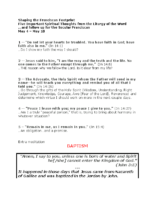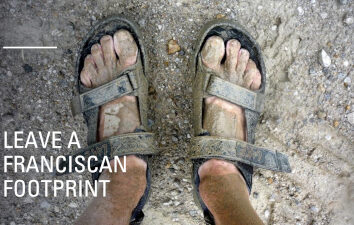Shaping the Franciscan Footprint
Five Important Spiritual Thoughts from the Liturgy of the Word
…and follow up for the Secular Franciscan
May 4 – May 10
1 — “Do not let your hearts be troubled. You have faith in God; have faith also in me.” (Jn 14:1)
…Do I show my faith the way I should?
2 — Jesus said to him, “I am the way and the truth and the life. No one comes to the Father except through me.” (Jn 14:6)
…THE reason why we follow the Lord. Is it clear from my life?
3 — The Advocate, the Holy Spirit whom the Father will send in my name–he will teach you everything and remind you of all that I told you.” (Jn 14:26)
…Go through the gifts of the Holy Spirit (Wisdom, Understanding, Right Judgement, Knowledge, Courage, Awe [Fear of the Lord], Reverence) and determine which virtue I should work on more in the next couple days.
4 — “Peace I leave with you; my peace I give to you.” (Jn 14:27)
…Am I a truly “peaceful person,” that is, trying to bring about harmony in whatever situation?
5 – “Remain in me, as I remain in you.” (Jn 15:4)
…An obligation…and a promise.
Extra meditation
BAPTISM
“Amen, I say to you, unless one is born of water and Spirit
he[/she] cannot enter the Kingdom of God.”
(John 3:5)
+++
It happened in those days that Jesus came from Nazareth
of Galilee and was baptized in the Jordan by John.
(Mark 1:9)
You have probably met a couple of saints in your life. They may not be formally canonized, but they should be. Two of them lived in the same town that the pastor lived in.
One was in her 90’s and a little hard of hearing and could not walk long distances. It was too risky for her to go to Church, which she wanted to do in the worst way. She was one of the well-known people in her small town simply because of her holiness. The pastor celebrated home Masses for her, and one particular time, he gave a little homily on whatever. After Mass, she told her granddaughter, in a pretty loud voice as many hard-of-hearing older people do, “I didn’t understand one thing that priest said!” The fact is: she did not need to because she was what can be called a practical theologian. She had put her faith into everything that she did.
The other practical theologian in that same town helped the pastor of the town provide a temporary home for someone who really needed help and she literally saved that young person’s life. She also was a practical theologian. A little later as she neared the end of her life, she was involved in a very bad accident. She had to wear one of those braces that, in effect, molded a steel cage around her head to keep her from moving her neck. The medical field has something a little more user-friendly now, but she looked awful, and people felt awful for her. But she lived out her life with an attitude that she put into words at one time. She said: “This is good. God still wants me to do something with my life.” There is little doubt that she did it. It is a statement of a practical theologian.
A practical theologian is one who has put Baptism into practice. It makes our Baptism something that is a true guide for living well. We celebrate that thought on the feast of the Baptism of Jesus. Jesus used the Baptism of John to say to us that every one of us must begin using our Baptism as a guide just as Jesus did in a most human way. Baptism becomes a guide when we put into practice the characteristics of Jesus.
All Christians are baptized, most of them very young. We are Christians, and almost immediately, we have to wonder why with so many baptized Christians, there are still so many problems in the Christian world, and in our own little worlds. If we were better practical theologians, that would change.
A Methodist minister a couple of years ago put it this way. The minister stated that the problem with most Christians is that they have not fully embraced the call of Christianity. Using strong accusatory language, he said: “If ministers and their flocks would worry more about listening to the call of Jesus, and less about money and whose religion is right or wrong, we wouldn’t have the mire and misery that we have now.” He is a little negative, but there is a lot of truth there.
Listening to the call of Christianity means being practical theologians, and how do we do that? We know the answer. We take the time to address the mire and misery in our own homes and in the situations that we can do something about. We can do things like: regulate TV and movies, make sure young people get the Christian education they need, pray more, go to the sacrament of Reconciliation more, volunteer more, and so forth.
We need practical theologians in our Church today. They should be us.

